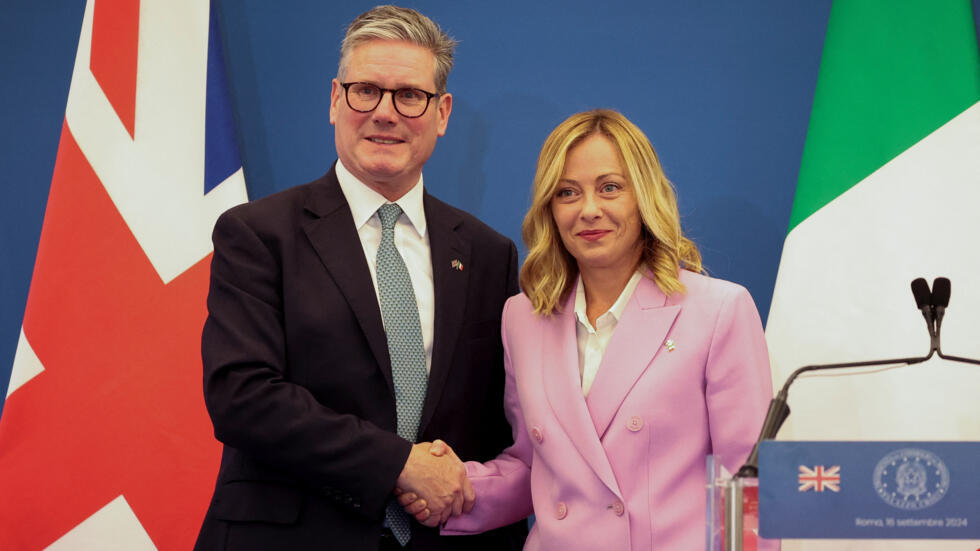
Sir Keir Starmer, the UK Prime Minister, has embarked on his first official visit to Rome to discuss migration with Italian Prime Minister Giorgia Meloni. At the top of the agenda is Italy’s innovative approach to managing migration, particularly its scheme to process asylum claims by sending rescued migrants to Albania.
Starmer is keen to understand how Italy has successfully reduced the number of migrant arrivals, as Italy is an EU member that has traditionally received the highest number of such arrivals. “I’ve long believed that prevention and stopping people from traveling in the first place is one of the best ways to address this issue,” Starmer remarked before the meeting.
Despite their divergent political backgrounds—Starmer, who began his political career with the young socialists and now leads a Labour government, and Meloni, who started with the young neo-fascists and now heads a right-wing coalition—the two leaders are united in their goal to strengthen European ties and address the migration challenge.
The meeting will focus on “irregular migration” and explore how both countries can reduce sea arrivals. According to Frontex, the EU’s border agency, there has been a 64% drop this year in dangerous crossings from North Africa to Italy. Just over 43,000 migrants have arrived in Italy so far this year, compared to nearly 158,000 in 2023. Many of these migrants attempt to continue their journey through France to the UK.
The UK is currently grappling with a rise in Channel crossings from France, with recent tragedies underscoring the crisis—eight people died on Sunday when a boat capsized.
Central to Italy’s success in reducing migrant crossings are financial agreements with Tunisia and Libya, the primary departure points for many migrants. In 2023, the EU provided Tunisia with €105 million to enhance border security and train its coastguard. Italy also contributed by supplying patrol vessels and an additional €100 million to support local businesses and invest in education and renewable energy. Additionally, Italy has signed a significant gas deal with Libya and is involved in training and equipping the Libyan coastguard.
These strategies are reminiscent of the EU’s approach with Turkey during the 2016 migration crisis, when a €6 billion deal was struck to curb departures by boosting border controls. However, the current agreements with North African nations are controversial.
Human Rights Watch has criticized Italy and the EU for alleged complicity in severe human rights abuses in Libya, including murder, torture, and sexual violence. EU foreign policy chief Josep Borrell has expressed concern over the EU’s deal with Tunisia, citing the country’s deteriorating democratic conditions under President Kais Saied, who has suspended parliament and cracked down on opposition.
In Rome, Starmer will likely learn more about Italy’s plans to combat irregular migration, including the establishment of reception centers in Albania, which are expected to open later this year. Funded and managed by Italy, these centers will have the capacity to hold up to 36,000 migrants annually. While at these centers, migrants can apply for asylum in Italy; those who are denied will face deportation.
The Albanian government views this arrangement as a bilateral deal with Italy. However, Starmer has shown interest in this outsourcing model and has previously discussed it with Italian and Albanian leaders at the European Political Community summit in Blenheim Palace.
Foreign Secretary David Lammy highlighted that Starmer’s discussions with Meloni will focus on Italy’s successful migration management, particularly in collaboration with Albania. Lammy noted that the UK is interested in exploring similar models with other countries, including Syria and Libya.
Alberto-Horst Neidhardt, a migration specialist at the European Policy Centre, remarked that the UK’s lack of influence within the EU complicates its ability to manage migration flows effectively. He suggested that turning to Italy for solutions makes sense given the challenges faced by the previous UK government in negotiating with France.
Meloni, once a close ally of former UK Prime Minister Rishi Sunak, may find her political rapport with Starmer less seamless. Nonetheless, as one of the EU’s leading right-wing figures, Meloni’s insights could prove crucial in addressing the complex migration issues facing Europe. For Starmer, navigating this challenge will require a collaborative approach, and Italy’s experience offers valuable lessons.








